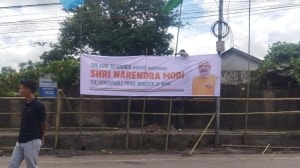The repackaging of Savarkar
It isn’t only those with a charitable bent of mind who will acknowledge the inalienable right of those who seek to include V.D. Savarka...

It isn’t only those with a charitable bent of mind who will acknowledge the inalienable right of those who seek to include V.D. Savarkar in their personal pantheon of “national heroes” to do so. However, when those of us who don’t exactly share this overly adulatory perception of Savarkar — and who, on the contrary — are branded as “strange” beings with a warped sense of history, it becomes important to crawl out of the woodwork and join the “liberal rabble” in making a fuss.
Savarkar is being repackaged today by Hindutva hard-sellers as a patriot, a “thinking man’s Hindu” who provided an intellectual framework for Hindutva and shaped the consciousness that evolved into Indian nationalism. In fact, the pitiful limits of Savarkar’s “patriotism” have been sufficiently well documented: his appeals for clemency when he was incarcerated in the Andamans plumb the depths of craven genuflection before the British rulers of his “motherland”. So shameful, so cringing, was the surrender by the man the Hindutva horde venerates as ‘The Brave One’ that revisionist historians today feel compelled to work overtime to convince the world that the clemency appeals were a masterly stratagem by Savarkar to secure his release and continue with his “patriotic” struggle.
Contrast this with Mahatma Gandhi’s principled refusal to even post bail following his arrest in the Champaran struggle, which so frustrated the British magistrate that he ordered his release unconditionally. Hindutva apologists further claim that much of the criticism of Savarkar’s politics springs from an unwillingness on the part of secular democratic forces to acknowledge the fact that Hindutva has an intellectual tradition. This claim is open to criticism on several counts.
The mere existence of an intellectual framework, such as it is, does not invest Hindutva with any greater legitimacy or political acceptability. Nazism too had an “intellectual tradition”, a particularly perverted one at that; it too had its ideologues. That Nazism had an ideological mooring does not elevate it beyond the pale of well-articulated criticism of that ideology or make it any less perverse. Likewise with Hindutva: the secular democratic criticism of the Hindu Right springs not from a perception that Hindutva lacks an intellectual tradition, but from the fact that that its “intellectual core” as articulated by the likes of Savarkar is rotten, that it feeds and thrives on the politics of hate, and that it is completely unacceptable to those who make up the “liberal rabble”.
Beneath Savarkar’s advocacy of a strident political Hindu identity is a militarist philosophy: and his articulation of this philosophy in such definitive tomes as Glorious Epochs of Indian History offers a telling insight into the perverse manner in which the mind of this “thinking man’s Hindu” worked. For instance, Savarkar regrets that Hindu rulers of medieval times, who in his estimation offered valorous challenge to Mughal rulers, did not order the rape of Muslim women. In fact, he virtually chastises long-gone Shivaji, that other icon of Maratha pride, for not ordering such action. And it is such a man — whose “prodigious mind” justifies the rape of women as a defensible instrument of oppression — that Hindutva camp followers valorise as an intellectual giant!
Assigning Savarkar an appropriate place in history isn’t just a clinical, academic exercise in political correctness. The importance of carrying out a historically accurate appraisal of his role is driven by the fact that Savarkar’s perverse philosophy continues to ignite the minds of many of today’s Hindutvawadis. The BJP today preaches and practises the same politics of hatred he gave the intellectual framework for. The demolition of the Babri Masjid in 1992, the riots in Mumbai and Gujarat that followed it, the targeted attacks on Christian missionaries in Madhya Pradesh and Orissa, and the Gujarat pogrom in 2002 are all the poisonous fruits of the tree that he planted.
Which is why he does not — and will never — figure on the “liberal rabble’s” pantheon of national heroes. And contrary to Hindutva apologists’ claim, our refusal to acknowledge Savarkar as a hero is not born of an eagerness to erase his memory. In fact, we want to perpetuate his thoughts: they are, ironically, the strongest damnation of the monstrosity that goes under the label of Hindutva.
Photos





- 01
- 02
- 03
- 04
- 05


























